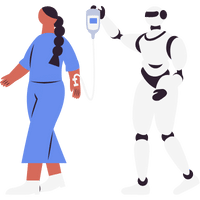Artificial intelligence (AI) is transforming the healthcare industry in ways that were previously unimaginable. From early disease detection to personalized treatment regimens, AI has huge potential to improve patient outcomes and speed up healthcare processes. Here are some of the most significant ways AI is altering healthcare:

1. Early disease detection and diagnosis.
AI algorithms excel at quickly and accurately evaluating large datasets, making them ideal for early-stage illness detection and diagnosis. AI, for example, may study medical images like X-rays and MRIs to find irregularities that could indicate cancer, heart illness, or neurological problems. By detecting diseases in their early stages, AI enables timely intervention, which improves patient outcomes.
2. Personalized Treatment Plans
AI-powered technologies can use a patient’s genetic information, medical history, and lifestyle data to provide individualized treatment regimens. This personalized approach guarantees that patients receive the most effective medicines based on their individual profiles. For example, in oncology, AI can anticipate how a patient will react to certain therapies, helping clinicians to select the best appropriate cancer therapy.
3. Drug Discovery and Development.
The process of identifying and developing new medications is time-consuming and expensive. This process is accelerated by AI, which analyzes biological data and predicts how various substances will interact with body targets. This accelerates the identification of prospective medication candidates and shortens the time required for clinical trials. Companies such as DeepMind and Atomwise are utilizing AI to transform drug research, resulting in faster creation of novel treatments.
4. Enhancing Medical Imaging.
AI is advancing the area of medical imaging by increasing the accuracy and efficiency of image analysis. AI systems may spot minute differences in photos that the human eye may miss, resulting in more accurate diagnoses. Additionally, AI can assist radiologists in prioritizing essential cases, ensuring that patients who require emergency attention receive it as soon as possible.
5. Predictive Analysis for Patient Outcomes
AI use predictive analytics to forecast patient outcomes based on past data. By evaluating trends in patient data, AI can forecast the risk of complications, readmissions, and disease progression. This data enables healthcare practitioners to make proactive decisions, manage resources more effectively, and deliver better patient care.
6. Virtual Healthcare Assistants
AI-powered virtual health assistants offer patients 24/7 support and individualized health information. These assistants can answer medical queries, remind patients to take their meds, and track their symptoms. Virtual assistants aid patients in better managing their health by offering ongoing support, reducing the need for in-person appointments.
7. Streamlining administrative tasks.
AI automates numerous administrative processes, allowing healthcare personnel to focus on patient care. Appointment scheduling, medical coding, and invoicing are all tasks that AI can perform. This eliminates administrative hassles, errors, and increases overall healthcare system efficiency.
8. Advance Telemedicine
The COVID-19 epidemic showed the need of telemedicine, and AI is bringing it to new heights. AI-powered telemedicine solutions can diagnose and recommend treatments for mild diseases, triage patients, and set up virtual consultations. AI improves the quality and accessibility of remote healthcare, enabling patients to get care from the comfort of their own homes.
9. Improving Mental Health Care.
AI is also making progress in mental health treatment. AI-powered apps and chatbots offer cognitive behavioral therapy (CBT), mindfulness activities, and emotional support. These tools make mental health resources more accessible, decrease stigma, and provide support to people who might not seek traditional therapy.
10. Robotic Surgery
AI-guided robotic surgery is becoming increasingly common in operating rooms. AI improves the precision and control of surgical robots, resulting in less invasive treatments and faster recovery times. Surgeons can conduct complex surgeries more accurately, lowering the risk of complications and increasing patient outcomes.
To summarize, AI is transforming healthcare by increasing early detection and diagnosis, personalizing treatment regimens, expediting drug discovery, improving medical imaging, and streamlining administrative duties. As AI technology advances, its impact on healthcare will only rise, resulting in improved patient outcomes and a more efficient healthcare system.
